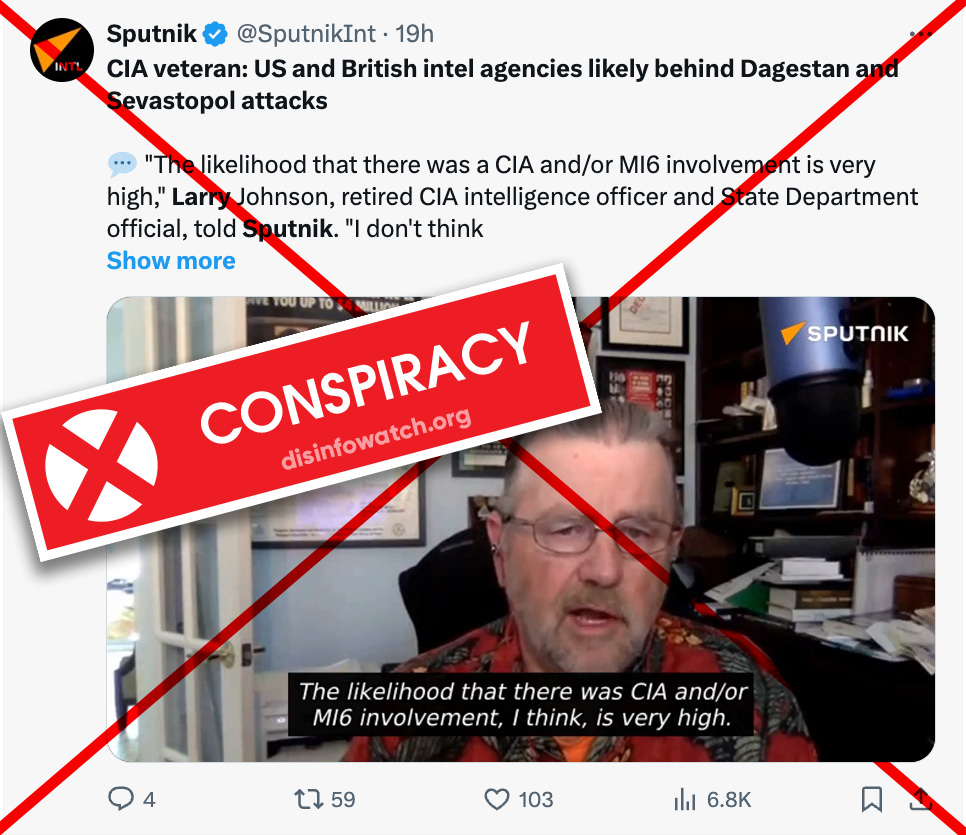
The Claim:
In a Twitter/X post, Russian state controlled media outlet, Sputnik, claims that recent attacks in Dagestan and Sevastopol were orchestrated by the CIA and British intelligence (MI6). Larry Johnson, a retired CIA officer, claims that western intelligence conspired to support the attacks claiming, without any evidence “I don’t think it’s just a coincidence that you had the attack in Sevastopol coincide with this series of attacks in Dagestan. At a minimum, it would have been a CIA incitement.” The post further amplifies Kremlin perspectives that claim that efforts by the West and Ukraine will ultimately unify Russia and strengthen its resolve to retaliate against those responsible.
Furthermore, this conspiracy was amplified by US conspiracy theorist, Scott Ritter, who posted a video to Twitter/X in which he claimed that the “terrorist attack in Dagestan that appears to have all the hallmarks of western involvement”, without providing any evidence.
The Facts:
There is no evidence of Ukrainian or Western involvment in the attacks in Dagastan. Similar accusations were made by the Kremlin and Russian state controlled media after that Crocus Theatre attacks.
This Sputink post relies on statements from Larry Johnson, who is described as a “retired CIA intelligence officer and State Department official.” The use of a supposed authority figure lends credibility to the claim without providing any concrete evidence.
The article attempts to draw a direct connection between the attacks in Dagestan and Sevastopol. By suggesting a coordinated effort involving Western intelligence agencies without presenting any evidence, it creates a misleading narrative. The timing of unrelated events is used to imply causation, a common propaganda technique, and the foundation of many conspiracy theories.
Statements that claim without any supporting evidence that “the likelihood that there was a CIA and/or MI6 involvement is very high” is speculative and lack any substantiating details. Such vague assertions are intended to sow doubt and create a sense of conspiracy without needing to provide proof.
The claim that “the West, in concert with Ukraine, has decided to shift its focus to trying to promote terrorist attacks in Russia” attributes speculative malicious intent to Western countries and Ukraine without any proof. This serves to demonize these entities and rally domestic support against perceived external threats.
Mentioning the deaths of civilians, policemen, and an Orthodox priest in the Dagestan attacks appeals to the readers’ emotions. By highlighting the victims and falsely framing the attacks as part of a Western conspiracyt, the narrative aims to provoke anger and fear, strengthening anti-Western sentiment.
The statement that the West’s efforts will unite Russia and make it more determined to retaliate is a form of psychological manipulation. This is coupled with Vladimir Putin’s recent threats supply weapons to nations that could attack the United States and Ukraine’s Western allies, which is part of the Kremlin’s psycholgical warfare against the Western world.

